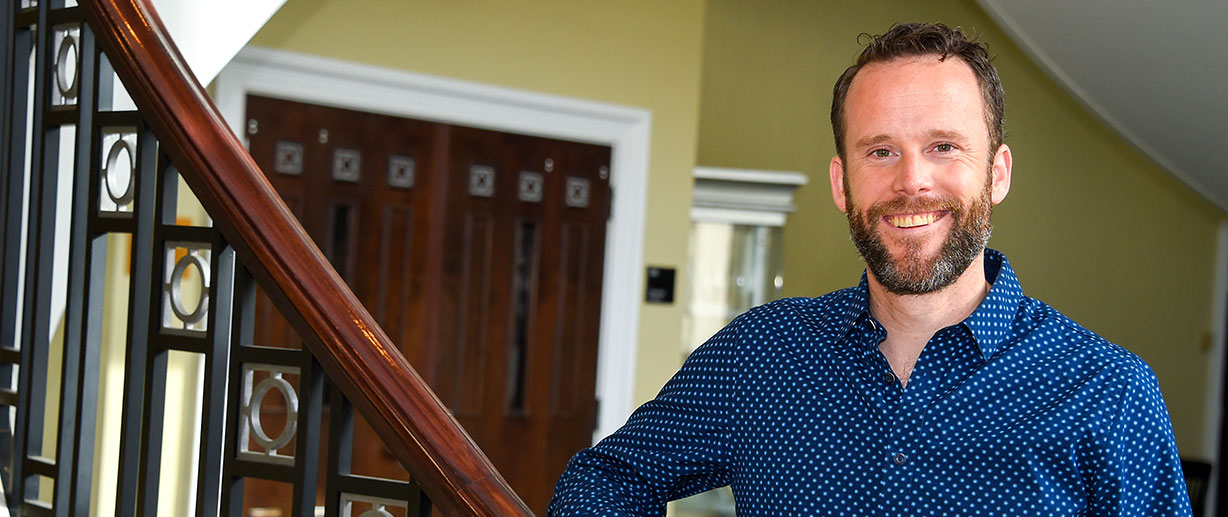SPARTANBURG, S.C. – Learning languages beyond English is essential for today’s students facing numerous challenges on a global level, according to Dr. Britton W. Newman, associate professor of Spanish at Wofford College.
Newman’s commitment to not only teaching a language but to increasing students’ understanding of communicating across cultures, has garnered him the 2020 Excellence in Teaching Award, presented by South Carolina Independent Colleges and Universities.
Each year SCICU honors “best of the best” among the faculty at its 20 member colleges and universities, recognizing their effective leadership and mentorship inside and outside the classroom. Honorees receive a professional development cash award.
“Something I acknowledge with my students on the first day of class is that there are massive challenges on a global level that we have to face during their lifetimes,” says Newman. “The increasing division, suspicion and hatred among groups in recent years makes it harder and harder to address challenges in areas such as climate change, global health and sustainable economic systems. The first step toward cooperating to address these challenges is literally being able to speak to one another, to understand the ideas someone else can offer, in a way that signals respect rather than arrogance. For that reason, learning languages beyond English is essential.”
“Britt Newman has been a leader, both at Wofford College and in foreign language education, in intercultural teaching and learning,” says Dr. Mike Sosulski, Wofford’s provost. “This is a high-leverage teaching practice that pushes students to carefully reflect on and interrogate their assumptions about cultural norms, making learning less transactional and more transforming of one’s perspective. This approach has not only enlivened Britt’s teaching – in the classroom and in living-learning communities he leads – but his scholarship as well.”
“Since his arrival at Wofford eight years ago, Dr. Newman has become increasingly involved in the scholarship of teaching and learning, and he has published multiple articles and chapters on the integration of intercultural learning into language, curricula,” says Dr. Stacey R. Hettes, associate provost for faculty development and professor of biology. “He is currently conducting research studies measuring the magnitude and durability of intercultural learning achieved through study abroad and measuring intercultural learning gains within first-year students in an intercultural learning themed interdisciplinary living-learning community.”
Newman, a graduate of the University of South Carolina who holds Ph.D. and master’s degrees from the University of North Carolina Chapel Hill, is conducting the intercultural competence research in a living-learning community for first-year students with Dr. Daniel B. Mathewson, associate professor of religion. Within literary studies, Newman has published multiple articles on contemporary Cuban narrative with an emphasis on the legacy of cultural hybridity left by the Cuban-Soviet Cold War alliance.
“Britt’s colleagues say of him that his thirst for knowledge is contagious,” Hettes continues. “He is interested in intercultural studies but he makes links to so many other fields, which really enriches his students’ experience. He is constantly reading and taking online courses outside of his area to broaden his knowledge base.”
Newman says incorporating intentional intercultural competence into his teaching is as important as teaching the language. “Equally important is the ability to recognize that communicating with someone of a different culture isn’t simply a matter of learning a code. It’s not enough to know the word ‘fair’ in English equates to ‘justo’ in Spanish. The real question is, what do speakers from those cultures mean when they say the word? What cultural values, historical context and personal experiences shape the meanings we each give to those words?
“Moreover, what does that person see when looking at me – a white American man – and how do power dynamics related to our two identities impact our communications?” he asks. “These are complicated questions, and we may never get the answer exactly right, in all its nuances, but with practice and experience, we get a clearer and clearer sense of where other people are coming from and what they mean.
“Intercultural competence work is important for that reason,” Newman adds. “It points us toward the value of understanding as much as possible the influences a person or a group is formed by and also understanding that we, ourselves, are shaped by the same types of influences and that our norms, expectations and meanings aren’t universal. Once students have a good grasp of this general idea in very large-scale terms, comparing themselves to a culture concentrated in another part of the world, I like to point out that the same process is at play in our everyday interactions with people in our home environment.”
Newman says intercultural skills also prepare us for “participation in a democratic process in a pluralistic society. The intercultural competence research that Wofford colleagues and I conduct aims to find better ways to help us all improve our capacity to understand where we and others are coming from, to tolerate the discomfort and uncertainty that can arise in intercultural encounters rather than retreating back to our comfort zones, and to actively engage with diverse others in ways that help us advance toward cooperatively identifying and addressing important challenges.”
Of his SCICU recognition, Newman says, “It’s an honor to receive this award. Faculty at Wofford tend to really pour themselves into the work of designing learning experiences for their students, expanding their own knowledge and skills and mentoring students with feedback and dialogue. I certainly do, and that work is rewarding in itself. To be recognized by my colleagues, to know that people whom I respect so deeply also think I’m doing a great job – that’s very affirming and motivating.”
